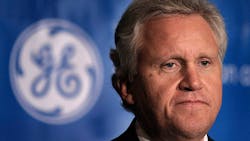Financially Unburdened, GE Wins Approval to Shed Too-Big-to-Fail Label
General Electric Co. won approval to drop its designation as a too-big-to-fail financial institution, capping a transformation that has included the sale of almost all of its lending business.
The Financial Stability Oversight Council determined that GE no longer poses a threat to U.S. financial stability, the panel said Wednesday in a statement. The decision marks the first time a company has been granted formal release by the council.
The move marks a victory for CEO Jeffrey Immelt, who opted to sell almost $200 billion of finance assets with the goal of removing the company’s designation as a systemically important financial institution. By pulling GE out of the lending business built up under former CEO Jack Welch, Immelt has shifted focus to a growing software division and industrial manufacturing of such items as power turbines and jet engines.
GE has been working with regulators for more than a year to escape the classification — which identifies companies whose failures would threaten U.S. financial stability — and the increasingly restrictive capital and leverage requirements that can come with it.
“GE Capital has made fundamental strategic changes that have resulted in a company that is significantly smaller and safer, with more stable funding,” Treasury Secretary Jacob Lew, who also heads the oversight council, said in the statement.
In a separate statement, GE Capital CEO Keith Sherin said, “This decision is a result of the transformation of GE Capital into a smaller, safer financial services company that meaningfully contributes to the success of GE’s industrial businesses.”
Since unveiling the plan in April 2015, GE has unloaded businesses including vehicle-fleet financing and commercial real estate. The company plans only to retain financial units, such as aircraft leasing, that support GE’s manufacturing operations.
The Financial Stability Oversight Council, a panel of regulators that identifies systemic risks, named GE Capital as one of four systemically important nonbank financial firms back in 2013. The designation tightened regulatory scrutiny of the unit and in coming years will lead to stricter capital-planning and stress-testing requirements.
The panel is seeking to reverse a March court ruling that eliminated MetLife Inc.’s classification as systemically important. The life insurer says the designation was arbitrary and unjustified. U.S. District Judge Rosemary M. Collyer in Washington ruled that the council’s process was “fatally flawed.”
Insurers American International Group Inc. and Prudential Financial Inc. also have been labeled as nonbank systemically important financial institutions. AIG CEO Peter Hancock said last month that the status “does not constrain our objectives” to return capital to shareholders. Still, he has been selling assets to simplify the company and said in May that AIG could have an opportunity “down the road” to consider exiting the designation.
GE investors had been calling for the company to reduce its exposure to financial markets since GE Capital jeopardized the parent company in the financial crisis. Selling the bulk of the unit was instrumental in drawing the support of Nelson Peltz’s activist investment firm, Trian Fund Management LP, which in October announced a $2.5 billion stake in GE. That purchase helped push GE shares to a 23% gain in 2015.
By Richard Clough, with assistance from Katherine Chiglinsky
About the Author
Bloomberg
Licensed content from Bloomberg, copyright 2016.
